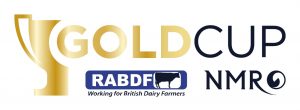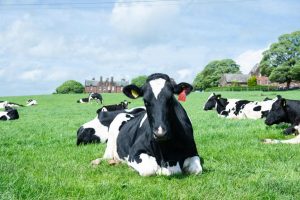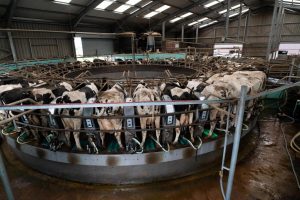
Fat supplements are incorporated into dairy diets to provide energy and enable cows to maintain butterfat levels. Most of those used in the UK are formulated with palm acid oil.
While there is nothing nutritionally wrong with this, palm oil production in general is associated with deforestation and a high carbon footprint.
This caused researchers at Nottingham University to consider if a palm-free supplement could be used instead as a way to lower dairy emissions without hindering performance.
Philip Garnsworthy, professor of dairy science at the university, led the research.
It was funded by Innovate UK through the Centre for Innovation Excellence in Livestock, with Ufac-UK involved as a commercial partner.
“The idea was that we would look at ways of reducing the carbon footprint of dairying, while improving cow efficiency,” he says.
Trial method
A test fat was formulated by Ufac, using locally sourced vegetable oil – mainly rapeseed – and fish oil, and it was treated to make it inert in the rumen.
It was then combined with a high-fibre carrier to minimise the risk of digestive upsets, which are often associated with liquid oil passing through the rumen.
The control fat was palm-based calcium soap. At the time of the trial the cost/t of the test fat was cheaper than the control fat. Each was included in the ration at the same rate.
The study was carried out on a group of 50 cows, split into two groups of 25. All the cows were more than 50 days in milk at the start of the experiment – just past peak lactation.
They were fed a partial mixed ration comprising grass, maize and wholecrop silages, as well as soya, OSR, molasses, minerals, and fat fed at a rate of 0.5kg a cow a day.
Milking was done via a robotic milker, three times a day on average. Concentrates were fed during milking according to yield, at a rate of 0.45kg/litre above 32 litres a day.
The trial took place over an eight-week period, giving the first group of 25 cows the control fat for the first four weeks and then test fat for the final four weeks.
This process was reversed for the second group, feeding the test fat first, followed by the control. Data recording was carried out at week four and week eight.
Results
Positive effects were seen, including significant differences in milk yields and quality, as well as increased feed efficiency, when cows were fed the palm-free supplement (see “Palm-free fat supplement trial results”).
As the researchers had hoped, the carbon footprint was also vastly improved – both in terms of the feed itself and the subsequent milk produced – when the palm-free supplement was fed, he adds.
The test fat showed a 64% reduction in feed carbon footprint compared with the palm fat:
- Control fat = 2,830g carbon dioxide equivalent (CO2e)/kg
- Test fat = 1,028g CO2e/kg.
There was also a reduction in the feed carbon footprint of the milk produced when feeding the palm-free fat totalling 11%:
- Control fat = 287g CO2e/kg of energy corrected milk (ECM)
- Test fat = 255g CO2e/kg ECM.
The feed carbon footprint covers all the carbon emissions associated with growing and harvesting a crop, as well as processing, transportation and so on, explains Prof Garnsworthy.
Conclusions
Compared with the control fat, the palm-free supplement:
- Increased milk yield as well as fat and protein content
- Did not affect dry matter intake
- Increased feed efficiency
- Did not affect methane emissions
- Lowered the carbon footprint of feed.
In addition, a change in the milk fatty acid profile suggested improved rumen fermentation of fibre, and healthier milk.
There was also evidence that the fat and vegetable oils in the test fat could improve cow health and fertility.
The Envirolac supplement is set to be launched commercially later this year.
Palm-free fat supplement trial results |
|||
| Control fat | Test fat | Difference | |
| Milk yield (kg/day) | 40.10 | 40.70 | +0.60 |
| Energy corrected milk yield (kg/day) | 41.30 | 42.90 | +1.60 |
| Butterfat (%) | 3.85 | 4.01 | +0.16 |
| Protein (%) | 3.01 | 3.06 | +0.05 |
| Fat yield (g/day) | 1,512 | 1,603 | +91 |
| Protein yield (g/day) | 1,199 | 1,239 | +40 |
| Fat plus protein yield (g/day) | 2,712 | 2,841 | +129 |
| Dry matter intake (kg/day) | 23.40 | 23.40 | No difference |
| Feed efficiency | 1.78 | 1.83 | +0.05 |
| Diet dry matter (DM) digestibility (ratio of DM digested over DM intake) | 0.722 | 0.739 | No significant difference |
| Methane (g/day) | 425 | 438 | No significant difference |
| Methane (g/kg energy corrected milk) | 10.50 | 10.20 | No significant difference |
| Notes: The test fat was also shown to increase milk short-chain fatty acids and docosahexaenoic acid, an omega-3 fatty acid that is generally considered to be beneficial for the health of both animals and humans
Source: Philip Garnsworthy/University of Nottingham |
|||

























